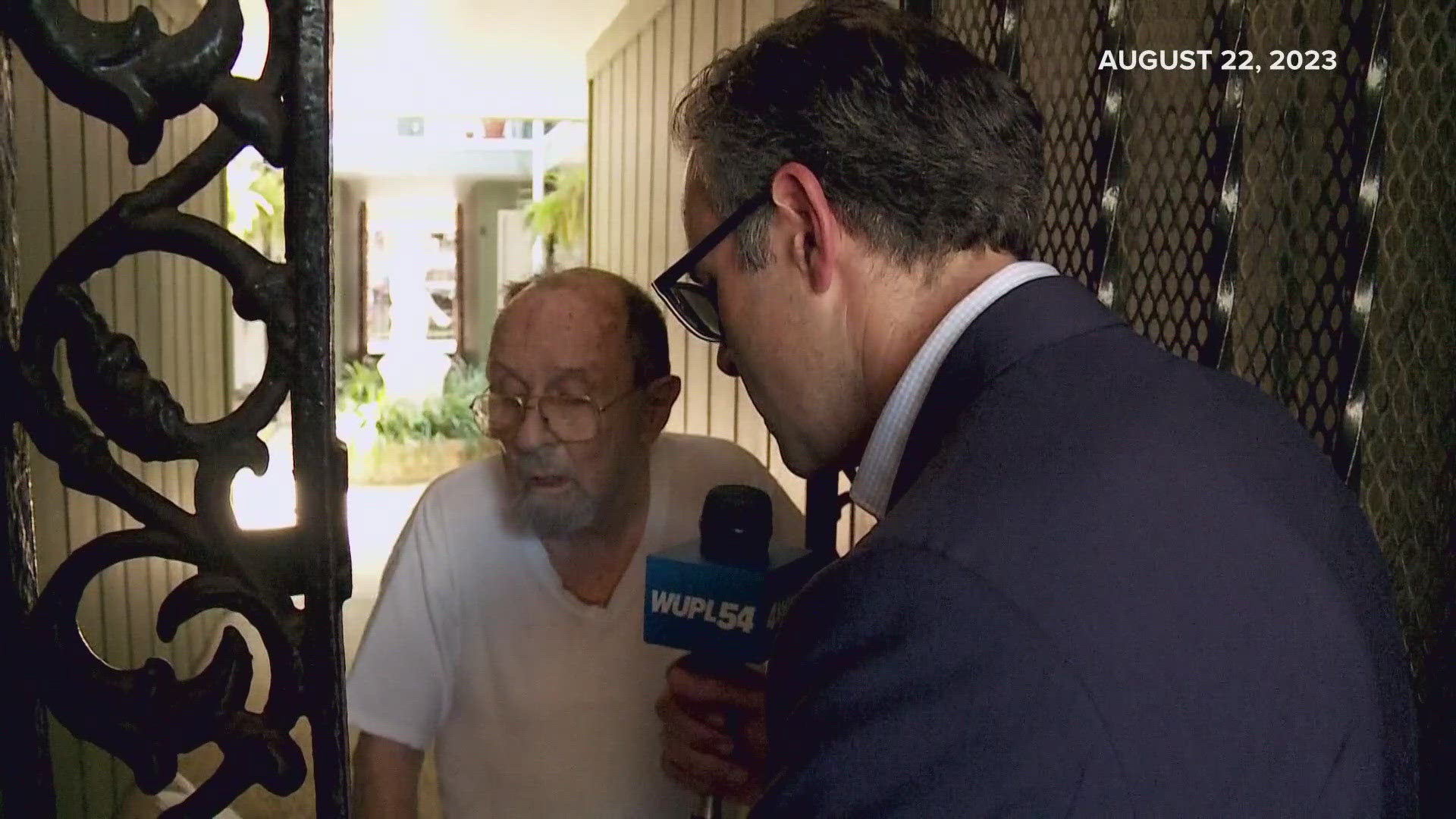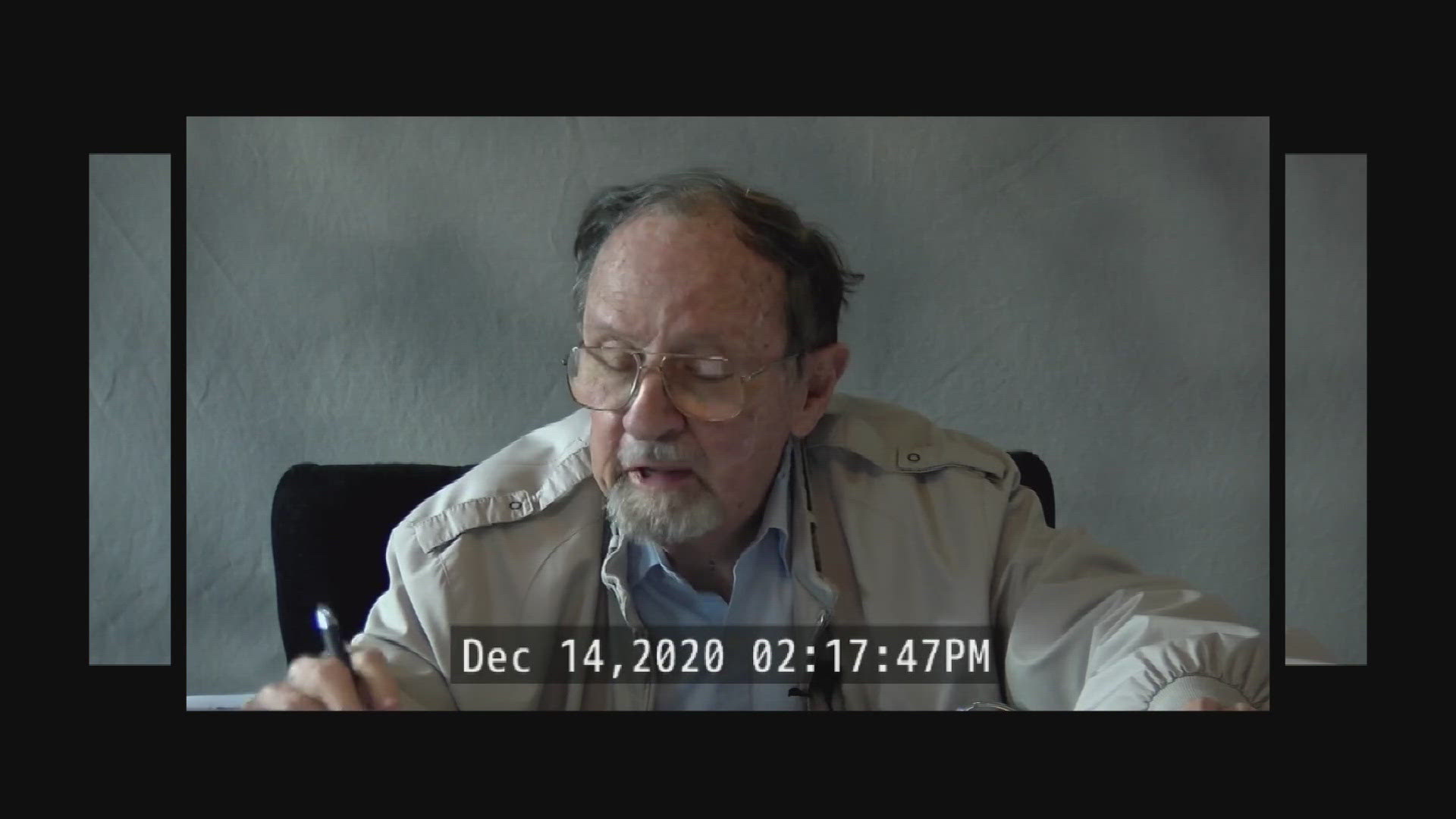NEW ORLEANS — WWL Louisiana and the Guardian have obtained a long suppressed, eight-and-a-half-hour deposition of a 92-year-old Catholic priest charged with physically overpowering and raping a boy in a New Orleans church in 1975.
Taken in 2020 as part of a civil lawsuit demanding damages from him and the church, in the deposition, clergyman Lawrence Hecker provides the most complete account yet of how the US’s second-oldest archdiocese spent much of its recent history taking extreme measures to keep the public from finding out about his abusive past. The questioning – which the church has fought in court for years to keep hidden – also reveals steps the city’s last four archbishops took to help him avoid accountability for decades.
Eventually, law enforcement officials were able to obtain an indictment charging Hecker with rape, kidnapping and other crimes in connection with an accusation that he strangled a teenaged student – at a school for boys interested in becoming priests – unconscious and sodomized him. A team of psychiatrists recently determined Hecker was mentally incompetent to stand trial at least for now. But a judge has not yet ruled on whether he intends to adopt that finding, which would likely delay the case months, if not longer – something that could be decisive in a case involving a defendant in his 90s.
Meanwhile, the case has since given rise to an inquiry aiming to determine whether the archdiocese of New Orleans presided over “widespread sexual abuse of minors dating back decades” that was “covered up and not reported to law enforcement.” That is the way Louisiana state police troopers described the investigation in a recent search warrant that court records show was served on the church as part of an investigation into alleged child sex trafficking.
WWL and the Guardian on Thursday published a report breaking down what the outlets consider to be the weightiest revelations of Hecker’s deposition. Given that the deposition spans hours as well as hundreds of pages of documents, the report is lengthy.
But in the summary below readers can find some big picture takeaways, along with analysis of some material which did not fit into the main report.
It may never be possible to know how many children Hecker abused after his ordination in 1958
The attorney who deposed Hecker, Richard Trahant, questioned him in connection to more than a dozen separate accusers.
Hecker acknowledged either molesting or harassing about a half-dozen of those victims in a 1999 statement that he provided to archdiocesan superiors.
The deposition also alludes to another remarkable document proving that Hecker was abusive: an apology letter which he penned to a victim that the archdiocese delivered on his behalf in about 2005. The contents of the letter weren’t discussed in the deposition, which Trahant said was not provided to him in advance of his questioning Hecker. But it is mentioned in archdiocesan records to which he referred during the deposition.
Ultimately, Trahant took Hecker’s deposition months before key filing deadlines associated with the archdiocese’s decision to solicit bankruptcy protection in May 2020. Those deadlines prompted hundreds of additional abuse claims pertaining to the archdiocese’s decades-old clerical molestation scandal, and Trahant alluded to how he expected that would produce more Hecker accusers.
At one point during his deposition, which was taken over two days, even Hecker himself became overwhelmed at the number of times with which he has been confronted with substantial child abuse allegations.
“There has been so many,” Hecker remarked. “We’ve looked at so much of this stuff – I can’t remember all of the stuff. It’s swimming around in my head. … I’m having trouble assimilating all this stuff y’all are saying.”
During another portion of his questioning, Trahant said to Hecker, “You have committed so many felonies against children that you can’t remember them all, correct?” Hecker avoided answering the question by invoking his rights against self-incrimination under the US Constitution’s Fifth Amendment.
Colloquially known as “pleading the Fifth,” Hecker invoked those rights 117 times during the deposition. That’s about once every four minutes.
Hecker’s history of complaints spans the entire US church abuse scandal
Abuse allegations against Hecker generally came in clusters around the major milestones in the US’s reckoning with Catholic clergy sexual abuse, which began in the 1980s, when Louisiana priest Gilbert Gauthe pleaded guilty to molesting several boys. More claims – and Hecker’s confession – came in the 1990s, when Louisiana priest Robert Melancon was convicted of raping an altar boy and sentenced to life imprisonment.
There were more claims in 2002, the same year that a clergy abuse and cover-up scandal which subsumed Boston’s Catholic archdiocese in 2002 and led US bishops to promise transparency as well as reforms.
Meanwhile, public outrage over a 2018 grand jury report in Pennsylvania which established clergy abuse within the state’s Catholic institutions was more widespread than ever thought prompted New Orleans’ archdiocese to publish a list of dozens of abusive clergymen. That roster not only included Hecker and was the first time he had been unmasked as a predator – but it set off another wave of abuse allegations against him, including the lawsuit that led to the deposition.
Hecker’s alleged abusive acts date back to the early 1960s. An archdiocesan memo mentioned during the deposition, without elaborating, says officials have reasons to suspect that he abused until 1997, five years before he was forced to retire.
The church was advised to oust Hecker from the clergy in 2002. It never did
In 2002, which was the same year Hecker retired, an advisory board meant to help the then-archbishop manage ongoing fallout from the metastasizing clerical abuse scandal advised him to boot the suspected serial child molester from the clergy.
Had archbishop Alfred Hughes successfully put Hecker through the process known as laicization, it would have prevented him from collecting lucrative retirement benefits. Instead, by not being laicized, Hecker received his full retirement benefits until the judge in charge of the church’s bankruptcy case required the church to cancel most of them.
Hecker revealed during his deposition that he wasn’t even aware that he had been recommended for laicization, a process he nonetheless could have opposed if it had been imposed on him unwillingly.
Hecker admitted to a federal crime with no statute of limitation – then tried to take it back
During one of the more notable exchanges during the deposition, Hecker replied, “Yes,” when Trahant asked him: “You would agree that some of this sexual molestation occurred on out-of-town trips, out of the state of Louisiana, correct?”
Hecker apparently soon realized what he had admitted and frantically said, “I – but I – no. I invoke my Fifth Amendment rights.” Trahant responded, “Well, I think you answered it and invoked your Fifth Amendment rights.”
Taking children across state lines for the purposes of sexually molesting them is a federal crime with no statute of limitation. Hecker has not been charged in connection with any federal offense.
Hecker’s statements about his mental sharpness were contradictory
Hecker’s mental acuity looms prominently in the state criminal court case pending against him. A team of psychiatrists that evaluated him opines that he has short-term memory loss which compromises his ability to assist the attorneys defending him, something the constitution requires him to be able to do to be tried for a crime.
Hecker indicated he did have short-term memory loss in a 2000 letter that he wrote to the congregants of the church where he was working at the time to explain why he was being transferred away from them.
But the real reason for his transfer was that a psychiatric care facility had diagnosed him as a pedophile, news which his superiors greeted by sending him on an out-of-state sabbatical. And records generated by that psychiatric evaluation made no mention of memory problems.
At the deposition itself, Trahant bluntly asked Hecker: “Do you have a problem remembering things from 15 minutes ago?”
“No,” Hecker answered.
Hecker was also contradictory about his long-range memory during the deposition. He demonstrated a razor-sharp recall of exactly what church he was working at during specific years as far back as the 1960s. Yet he repeatedly described himself as drawing a blank or having trouble remembering, mostly with respect to questions about what his superiors may or may not have known about the abuse allegations against him.
Hecker is one of many living, retired New Orleans priests facing credible abuse allegations
One of the more stunning exchanges in Hecker’s deposition saw him look over a list of 50 archdiocesan priests who were retired and still living. Most of the names were in blue – except 11, which were in red. Trahant established that the names of those in red were living, retired priests with abuse allegations that the archdiocese itself deemed credible.
“That would [mean] 22 percent of the retired, incardinated priests in the archdiocese of New Orleans have credible claims of sexual abuse against them,” Trahant said. “That’s a lot isn’t it? That’s over one in five.”
Hecker replied, “I do not know.”
Hecker’s attorney demonstrated a palpably high level of resentment toward him
New Orleans-area criminal defense attorney Eugene Redmann represented Hecker at the deposition and repeatedly berated him for rambling before answering yes or no questions. His frustration with Hecker was perhaps most apparent when, in a raised voice, Redmann took the Lord’s name in vain and told his client: “Stop diarrhea of the mouth – Jesus. Just answer the questions. We will never end.”
Typically, whenever Redmann’s patience with him ran thin, Hecker replied with something to the effect of: “I’m sorry. I don’t mean to be difficult for all of y’all.”
Hecker claims he believed celibacy meant only avoiding women
In both his 1999 confession and a summer 2023 interview with WWL and the Guardian, Hecker attributed his serial molestation of children to the libertine attitudes of the 1960s and 1970s. But molesting children was as illegal back then as it is now, Trahant pointed out during the deposition.
Hecker then offered up an alternative explanation: He said the church taught him that priests could honor their promise of celibacy simply by ensuring they were never “alone with a woman in private.”
“In fact, we were encouraged to be with younger people, especially younger boys, in the hopes that they would want to become priests,” Hecker said. “And then … it was definitely discouraged because of what was found out, that sometimes priests were – were being accused. So from then on, I made a promise to myself never to be alone with a person under 18 – period.”
Hecker and the church greatly feared media exposure
Hecker spoke plainly about how much he feared the media would one day report why he was forced to retire in 2002. “I would not want [friends] to know,” Hecker said. “We all didn’t want big publicity or anything.”
Trahant at one point established how one archdiocesan official issued a letter saying the church’s “only concern” was “that someone in his past might decide to go public”. Hecker pleaded the fifth when Trahant asked why “there was no concern for the minors that you raped, their families, or kids you might rape in the future.”


